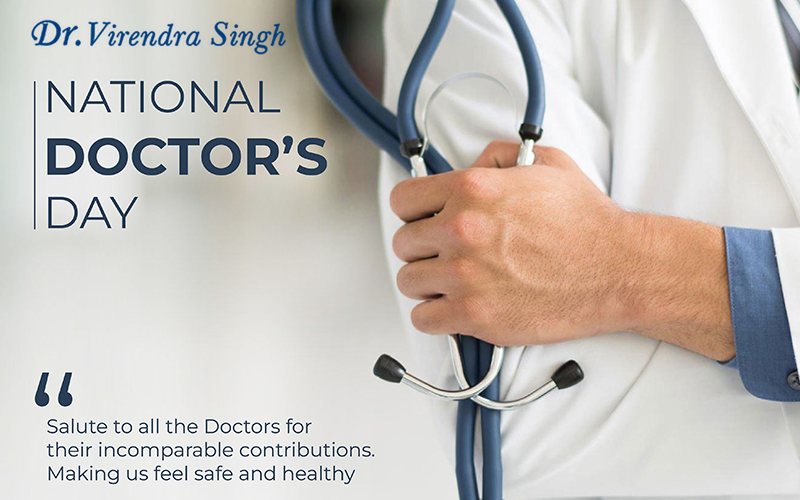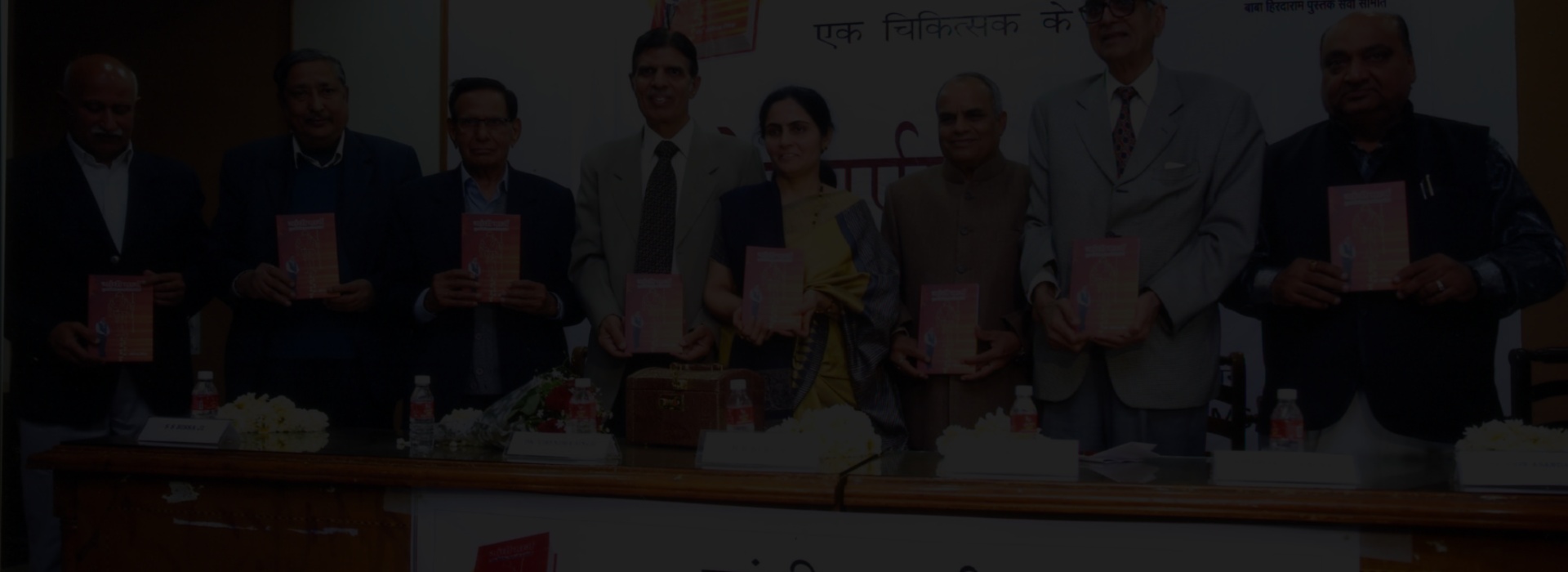
Every year, Doctor’s Day is celebrated on July 1 to honor and acknowledge the contributions of doctors and medical professionals to society and in the memory of Dr. Bidhan Chandra Roy. The second Chief Minister of West Bengal is the well-known physician Dr. Bidhan Chandra Roy. He was also awarded the Bharat Ratna in 1961. Celebrated on July 1st, Doctor’s Day is a time for communities, patients, and the medical fraternity to express their heartfelt gratitude towards the medical professionals who tirelessly work to save lives, alleviate suffering, and promote health and well-being. Their persistent work ethic, inventiveness, and caring assistance form the cornerstone of a robust healthcare system.
Doctors Day 2024 is not just a day of celebration but also a call to acknowledge the sacrifices made by these heroes and to renew our commitment to supporting and empowering them in their noble mission. We recognize and reward physicians who have made noteworthy contributions to medicine. There are many seminars, award ceremonies, awareness campaigns, free medical camps for the public, cultural programs, and professional gatherings.
On Doctor’s Day 2024, we honor the exceptional contributions of Dr. Virendra Singh, a revered guide and mentor in the medical community. He has nourished the upcoming generation of physicians as a mentor by providing them with profound wisdom, high ethical standards, and a compassionate attitude to medicine.
History of Doctor’s Day
The anniversary of Dr. Bidhan Chandra Roy’s birth is celebrated on Doctor’s Day. Known for his medical expertise, he served as West Bengal’s second chief minister. He was born on July 1, 1882. He has played a significant role in the development of India’s healthcare system and medical education. In addition, he received the Bharat Ratna, the highest civilian honor in India, in recognition of his services. The following describes the origins and guidelines of Doctor’s Day in India.
- Origin: In India, Doctor’s Day honors Dr. Bidhan Chandra Roy’s birth and death dates.
- Date: Celebrated on July 1st each year.
- Bidhan Chandra Roy: Born July 1, 1882, and died July 1, 1962.
- Distinguished Physician: B.C. Roy was the second chief minister of West Bengal and a renowned physician.
- Recognition: The purpose of the day is to appreciate and celebrate the achievements that medical professionals, including doctors, have made to society.
- Significance of July 1: The purpose of July 1st being designated as Doctor’s Day is to honor Dr. B.C. Roy, a physician who was also a statesman engaged in several social and political activities.
- Inception: The First Doctor’s Day was celebrated in India in 1991.
- Public Acknowledgment: The day offers the general people a chance to show their appreciation and gratitude for the committed work that physicians conduct.
- Wider Observance: Apart from India, several countries have their own Doctor’s Day, although the dates may vary.
- Celebratory Events: Various events including workshops, seminars, free medical camps, and award ceremonies are organized to mark the occasion.
- Awareness Initiatives: Doctor’s Day serves as an opportunity to encourage a better lifestyle and bring attention to healthcare-related issues.
- Professional Development: Medical professionals frequently attend meetings and conferences to talk about developments in their field and issues confronting the healthcare industry.
Significance of Doctor’s Day in India
Doctor’s Day in India is an opportunity to recognize the significant contributions of medical professionals towards society. The day is also a chance to inspire people to seek jobs in healthcare and to increase public awareness of the difficulties the healthcare industry faces.
The COVID-19 pandemic has underscored the crucial role of medical professionals in combating the virus and ensuring community safety. Engaging in Doctor’s Day activities is a meaningful way to express gratitude to these healthcare heroes and to raise awareness about the healthcare sector.
Importance of Doctor’s Day
The day seeks to raise awareness of the critical role that healthcare plays in promoting social well-being. This day also highlights the importance of health insurance to ensure access to a quantitative health care system. The public is being informed on this day about the advantages of inexpensive health insurance.
- Recognition and Appreciation: Valuing and honoring the significant contributions made by physicians and other health care providers.
- Gratitude for Service: Expressing appreciation for the doctors’ unselfish commitment, sacrifice, and service.
- Awareness and Education: Educating people about problems in healthcare, new developments in medicine, and the value of routine checkups.
- Professional Development: Participation in conferences, workshops, and seminars for professionals to talk about developments in medicine.
- Motivation for Medical Professionals: Supplying inspiration for healthcare providers to carry on with their committed work.
- Strengthening Doctor-Patient Relationship: Fostering understanding and mutual respect, emphasizing trust and communication in healthcare.
- Promotion for Public Health: Putting together awareness programs and providing free medical cramps to promote public health.
- Reflecting on Challenges: Offering an opportunity for discussing and reflecting on issues with the healthcare system.
- Cultural and Social Significance: Contributing to the nation’s cultural fabric and keeping Dr. Bidhan Chandra Roy’s memory alive. Offering a forum for discussing and reflecting on issues with the healthcare system.
- Unity in the Medical Community: Promoting solidarity among medical professionals and placing a strong emphasis on shared accountability.
Why we Celebrate Doctor’s Day in India
- Honoring Dedication: On Doctors Day, we honor doctors’ dedication to saving lives and their humanitarianism in the medical field.
- Recognizing Contributions: It honors the priceless contributions that physicians have made to the progress of healthcare, illness prevention, and public health.
- Expressing Gratitude: On this day, communities, patients, and colleagues may show their appreciation for the countless hours that doctors put in.
- Raising Awareness: On Doctor’s Day, support for the welfare and career advancement of medical professionals is encouraged and awareness of their significance is increased.
- Fostering Collaboration: It encourages cooperation between the public, politicians, and healthcare professionals to solve issues in healthcare and enhance patient outcomes.
FAQs
What is Doctor’s Day?
Doctor’s Day is a unique occasion set aside to honor medical professionals and recognize their contributions to society. Today is a day to honor physicians for their commitment, hard work, and positive effects on the health and well-being of their patients and communities.
When is Doctor’s Day celebrated in India?
In India, Doctor’s Day is celebrated on July 1st each year. This day celebrates the anniversary of the birth and passing of eminent physician Dr. Bidhan Chandra Roy, who made substantial contributions to Indian medicine.
Why Doctor’s Day is important?
Doctor’s Day is important because it acknowledges the vital role that doctors play in maintaining public health. It’s a day to show appreciation for their constant work, particularly in the midst of health emergencies like the COVID-19 pandemic, and to spread knowledge of the difficulties and successes faced by those in the medical field.
What are some ways to show appreciation to doctors on this day?
Personalized thank-you notes, social media posts about your pleasant interactions with your doctors, charitable contributions to healthcare organizations, medical event volunteer work, and support for improved working conditions for medical staff are a few methods to express gratitude.
Why is it important to celebrate Doctors Day?
Celebrating Doctor’s Day is vital for honoring the dedication and contributions of physicians to public health, disease prevention, and patient care. It offers an opportunity to express gratitude for their tireless efforts in saving lives and enhancing the well-being of communities.
